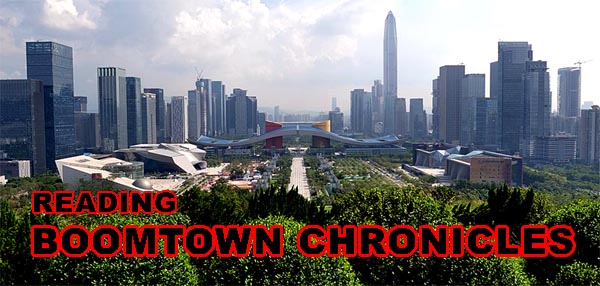 |
| Shenzhen, the Boomtown (Wikipedia) |
Note: Between Lesson #01-128 and #01-207, I wrote 72 lessons explaining expressions in articles published in the Shenzhen Daily. Read more about "Reading Boomtown Chronicles."
Get Ready: What can a city or a country do to turn around a battered economy?
Boomtown Chronicles Part I - published Monday, June 16, 2008 (cont.)
- on the "frontline"
Guangdong, we are told, was on the "frontline" of China's opening. As one word, this is usually an adjective, the noun being separated into two words, "front line." This was originally a military term, being the front part of an army, or the place where the battle occurs. It can be used metaphorically for the "front" of any action: "The sales staff is the front line of our company."
- "Even the name Shenzhen underlined the determination to turn around the battered economy."
underlined: emphasized. Literally it means "to draw a line under," as we do with new vocabulary words while reading. So the name of Shenzhen, with its reference to water, reinforces the idea of prosperity.
to turn around: literally, to go in the opposite direction. If a company's sales have been going down, and then begin to increase, we can say that sales have "turned around."
battered: beaten up, or pounded on consistently, like typhoons batter Southeast Asian areas. Prior to Shenzhen's rise, the economy in the area was in poor condition, like something that had been battered. This is also a figurative use.
- "reform was yet to unfold across the country"
unfold: What a picturesque idea! Reform unfolds, like a map, or a clean towel. It means "reveal itself," "to develop," or "to progress" (verb). "Let's start the campaign and see how things unfold."
- "city officials had to find ways to circumvent rigid rules and laws"
circumvent: The circum- part, of course, means "circle." But -vent isn't so obvious. It shows up in words like "adventure" and "prevent." From the Latin root ven-, it means "to come" or "arrive." In one of those odd flip-flops of language, most English words are better defined using "go" than "come." So circumvent is "go around"; adventure is "go out from," and prevent is "go before."
--------Read more: https://en.wikipedia.org/wiki/Shenzhen
Practice: Choose the correct term to fill in the blank in the sentence below:
- battered
- circumvent
- front line
- turn around
- underlined
- unfold
- The person who stands on the ________ has a greater risk, but also greater opportunities.
- Mark's recent foolish behavior ________ the correctness of the manager's decision to fire him.
- If we can't ________ our sales losses soon, the company may go under.
- Tom drove a ________ old car; no one would have guessed that he was rich.
- I can't wait to see the next episode in the series. I want to know how things ________ between the man and his mother.
- Sorry, but we may have to ________ the lock-out system if we're going to start your car.
Answers are in the first comment below.
Submitted to the Shenzhen Daily for July 3, 2008


Answers to the Practice: 1. d; 2. f; 3. a; 4. c; 5. b; 6. e
ReplyDelete